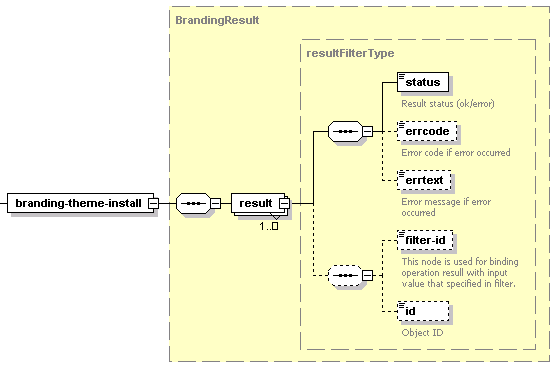Installing Custom Theme
The branding-theme-install operation is used to install custom themes to customize interface appearance.
Request Packet Structure
A request XML packet installing a custom theme includes the branding-theme-install operation node:
<packet>
<ui>
<branding-theme-install>
...
</branding-theme-install>
</ui>
</packet>
The branding-theme-install graphical representation is as follows:

Note: The interactive schema navigator for all request packets is available here: http://plesk.github.io/api-schemas/1.6.9.1/agent_input.svg.
- The filter node is required. It specifies the filtering rule.
For more information, refer to the Available Filters
section. Data type: BrandingInputFilter (
ui_input.xsd) . - The path node is required. It specifies the path to the custom theme file. Data type: string.
Note: When creating request packets, put nodes and elements in the order they follow in the packet structure.
Response Packet Structure
The branding-theme-install node of the output XML packet is structured as follows:

Note: The interactive schema navigator for all response packets is available here: http://plesk.github.io/api-schemas/1.6.9.1/agent_output.svg.
- The result node is required. It wraps the response retrieved
from the server. Data type: resultFilterType (
common.xsd). - The status node is required. It specifies the execution status of the operation. Data type: result_status. Allowed values: ok | error.
- The errcode node is optional. Is returns the error code if the operation fails. Data type: unsignedI nt.
- The errtext node is optional. It returns the error message if the operation fails. Data type: string.
- The filter-id node is optional. Returns the parameter by which the custom theme was filtered by in the request packet. Data type: anySimple.
- The id node is optional. Returns the identifier of the
installed custom theme. Data type: id_type (
common.xsd).
Samples
This packet installs a custom theme branding-theme.zip stored in the /tmp directory and provided by the reseller with login name JDoe:
<packet>
<ui>
<branding-theme-install>
<filter>
<vendor-login>JDoe</vendor-login>
</filter>
<path>/tmp/branding-theme.zip</path>
</branding-theme-install>
</ui>
</packet>
Response:
<packet>
<ui>
<branding-theme-install>
<result>
<status>ok</status>
<filter-id>JDoe</filter-id>
<id>1234</id>
</result>
</branding-theme-install>
</ui>
</packet>